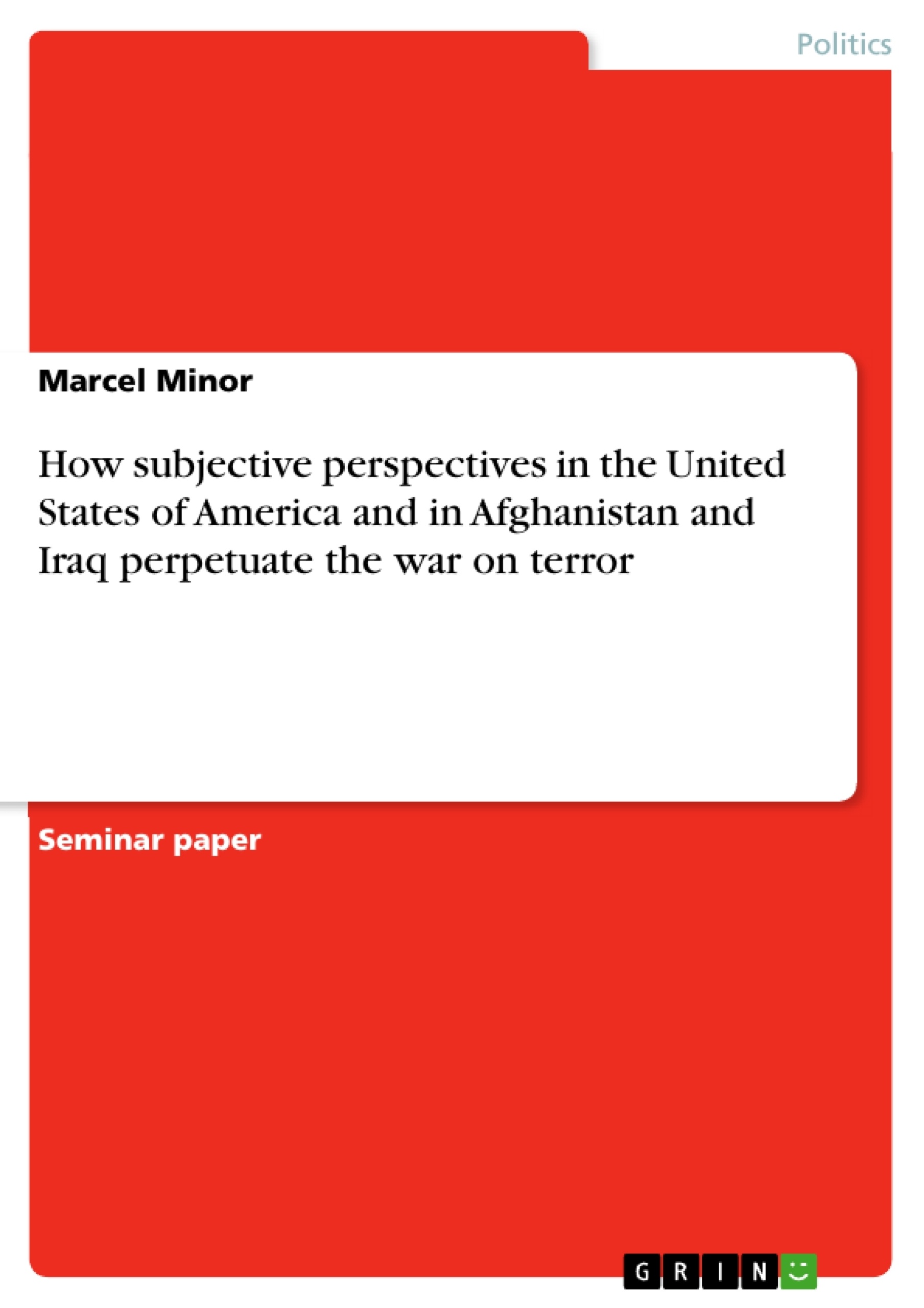This essay seeks to analyze these underlying structures, by focusing on the subject in two distinct and exemplary contexts: What structures surround the individual in the United States of America, in contrast to the ones in countries such as Iraq and Afghanistan? How do different apparatuses and power structures influence our behavior and perspective in regard to terrorism in general, how could they reproduce the hierarchical international order and perpetuate the war against terror?
Inhaltsverzeichnis (Table of Contents)
- The subject in the context of the United States of America
- The subject in the context of Afghanistan and Iraq
- Conclusion
Zielsetzung und Themenschwerpunkte (Objectives and Key Themes)
This essay aims to analyze the underlying structures that perpetuate the "War on Terror" by focusing on how subjective perspectives in the United States of America, in contrast to those in countries like Iraq and Afghanistan, contribute to the conflict. It investigates how different apparatuses and power structures influence perceptions and behavior regarding terrorism, potentially reproducing the hierarchical international order and sustaining the war against terror.
- The role of dispositifs or apparatuses in shaping subjective perceptions of terrorism.
- The impact of power structures on the framing of terrorism in different contexts.
- How discourse and institutions perpetuate the "War on Terror" and the divide between "the West" and "the rest".
- The influence of subjective perspectives on international relations and the perpetuation of conflict.
Zusammenfassung der Kapitel (Chapter Summaries)
The first chapter focuses on the individual in the United States of America and explores how their understanding of terrorism is shaped by surrounding apparatuses, including discourses, mechanisms of power, institutions, and laws. It examines the emergence of the term "terrorism" as a new category of violence and how it has influenced the perception of the "enemy".
The second chapter shifts the focus to Afghanistan and Iraq, analyzing the apparatuses that surround individuals in these countries and how they contribute to the perception of the "War on Terror". It delves into the influence of Western power structures, historical context, and the impact of interventions on the formation of perspectives.
Schlüsselwörter (Keywords)
The central themes and concepts explored in this work include dispositifs, apparatuses, power structures, subjective perspectives, the "War on Terror", international relations, terrorism, and the divide between "the West" and "the rest".
Frequently Asked Questions
How do power structures influence our view of terrorism?
Power structures and apparatuses (dispositifs) like laws, institutions, and media discourses shape how individuals perceive the "enemy" and define the category of terrorism.
What is the difference in perspective between the US and countries like Iraq or Afghanistan?
Individuals in the US are surrounded by Western discourses of security, while those in Iraq and Afghanistan are influenced by the immediate impact of interventions and local power structures.
How does the "War on Terror" perpetuate a hierarchical international order?
The framing of the conflict often reinforces a divide between "the West" and "the rest," where Western subjective perspectives are used to justify global interventions and maintain power.
What role do institutions play in shaping the perception of terrorism?
Institutions create the legal and social framework that categorizes certain acts as "terror" while potentially overlooking others, thus directing public behavior and sentiment.
Can changing subjective perspectives help end the conflict?
The essay suggests that understanding how these perspectives are constructed is a first step toward breaking the cycle of conflict and the perpetuation of the war against terror.
- Citar trabajo
- Marcel Minor (Autor), How subjective perspectives in the United States of America and in Afghanistan and Iraq perpetuate the war on terror, Múnich, GRIN Verlag, https://www.grin.com/document/1284322



